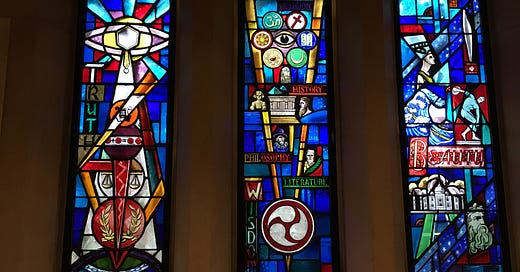My current profile avatar contains the motto, “Fear no truth”. What do I mean by that?
There is nothing esoteric here; the plain sense of the words is what I intend. The practical import is an admonition against self-deception or willful ignorance.
Perhaps such an admonition should go without saying, but evidently it does not. I’ll provide a couple of examples.
I was a college student in the late 80s, when AIDS was raging and no cure was in sight. My girlfriend at the time confided to me that she did not want to take an AIDS test. She said that if she had it, she didn’t want to know. “Why would I want to know that? Knowing would just ruin what little time I had left.” The answer to me seemed obvious; if she had it and didn’t know, she would be putting others at risk. She accepted this when I pointed it out to her.
In 2003, the George W. Bush administration sent American troops into Iraq, using falsehoods to justify an unnecessary war. When those falsehoods came to light, some people could not accept that their loved ones had been sent into harm’s way for no good reason, and were therefore reluctant to withdraw support for the war (I remember them saying as much in man-on-the-street interviews on TV). This is a particularly painful example of the “sunk cost” fallacy.
Some say, “the truth hurts”, but in my experience, lies do far more damage. There may be cases where we deceive someone for their own good, but I would prefer not to be deceived.
This does not mean we cannot take anything on faith. I am not advocating the position that Clark Clifford takes in “The Ethics of Belief”, which William James successfully rebuts in “The Will to Believe”.
All genuine spirituality begins with the rejection of nihilism, and I know of no alternative to nihilism that does not involve taking something on faith. Concerning things I take on faith, my priorities are these: I am a seeker of wisdom and truth, a believer in God, a follower of Jesus, and a member of the Catholic Church. Better yet, change those nouns to verbs: I seek wisdom and truth, I believe in God, I follow Jesus in my imperfect way, and I belong to the Catholic Church.
In that order. If, hypothetically, God did not exist, I would want to know that, for my commitment to seeking truth is more fundamental than my commitment to theism. If the teachings of Jesus, or someone’s interpretation of them, led away from God, then I would not follow. Were I ever to perceive a conflict between the core Christian teachings — the Way — and the specific teachings of the Church or the directives of its institutional leaders, I hope I would follow the Way. Truth > theism > Christianity > Catholicism.
Another reason to change those nouns into verbs: I’m not defining my identity, I’m describing how I try to make my way in the world. So much of the discourse around identity these days is idolatrous (in the sense that Paul Tillich talked about) and exemplifies bad faith (in the sense that Jean-Paul Sartre talked about)*, not to mention its corrosive political effects. I hope to go into identity discourse (and politics) in more depth in the future. For now, here’s a teaser: identity is an illusion — the self is real. And another: citizenship is a doing, not a being.
I seek wisdom and truth, conjointly. This is not to conflate the two. There are an infinite number of true propositions; most of them are not relevant for the pursuit of wisdom. We can learn many truths without gaining wisdom thereby, so truth without wisdom is possible. But is wisdom without truth possible? Depending on what the truth turns out to be, might we ever be better off in some sense if we did not know it or even believed the opposite? We might be better off in some sense, but I’m betting that we would not be better off without qualification.
Betting what? My life. Don’t misunderstand — I’m not seeking any kind of martyrdom. I just choose to live with my eyes open.
The road to truth and the road to harmony converge in heaven but diverge on earth. I choose to follow the road to truth. There may be times when we have to refrain from turning over certain rocks in order to avoid upsetting those we care about, but I hope I never do so just to avoid upsetting myself.
Meta stuff — July 2024
This newsletter hit a couple of milestones this month, exceeding 200 free subscribers and getting its first paid subscriber (who apparently paid in Norwegian currency — Tusen takk!).
I’m rethinking how I handle comments. So far, I’ve made all my content free, but have mostly restricted comments on posts to paying subscribers. I’ve done it this way because when I publish a post on Substack, this platform gives me two options for comments: allow comments from everyone, or restrict comments to paying subscribers. I would prefer to open comments to all and only subscribers, paying or not, but Substack does not offer that option, so I’ve chosen to restrict comments, based on my experience on other platforms. But now that this newsletter or whatever it is has enough subscribers to sustain an intelligent discussion, I think I’ll try opening up the comments, starting with this post. We’ll see how it goes.
*Addendum (5 Aug. 2024): Tillich was a Protestant theologian and Sartre was an atheist Existentialist philosopher — I take truth/wisdom where I find it. I suppose I should track down some relevant quotations or citations to insert here.




